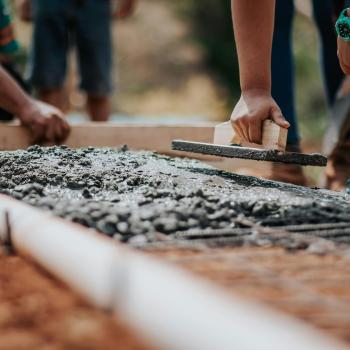In Haiti, where centuries have proven that lasting progress is elusive, hope seems harder and harder to come by. I remember when hope used to be fun and easy to find. The earthquake did a lot to change that. I want those days to return, but hope isn't being handed out like it used to be and is become increasingly harder to manufacture.
Honestly, it's never been easy in Haiti. Life teeters on a bleeding edge. Mistakes are costly and often irreversible. Hope is not some flippant emotion here, it's a genuine gamble.
It's easy to be critical of hope in the face of this great adversity. For the most part, I suspect that critics are being pragmatic. I certainly get the value in that, but I'm not really interested in the extremes, even the ones that spare me a bruise or two. If there is something to be hopeful about, I sure don't want to miss it and if bruises will grow me into a better version of myself, then I could stand to have a few more.
Hope implies that we're not there yet. The word points to the journey. It suggests that the end is far away. One doesn't dig deep for hope with the end in sight. Hope is born between mountains and valleys, from those places that are dark, difficult to traverse, and far from home. Hope is a choked stream, clawing its twisted fingers through the overgrown floor of the wilderness.
When our faith (our unprovable certainty) fails or offers us little comfort, I am grateful that we can fall back on hope. Synthetic as it may sometimes be, hope promises virtually nothing while somehow remaining sufficiently inspiring. It acts as a buffer between what we know and what we dream. It amplifies the possibilities and allows us to work diligently against inconceivable odds.
The best news is, even when hope seems lost, we can still love. Ultimately, it is love that faith seeks to know and that hope patiently serves. Haiti has taught me that love is not some far away heaven. At every possible moment, the ability to love is resting in the palms of our hands.
Whether or not I'm right about my faith . . . whether or not I'm wise about my hope, I am thankful that I can always be steadfast in my love, at home or abroad. Across Haiti's ever-expanding landscape of projects, initiatives, and best laid plans, love is the ultimate sustainability. When the final bell tolls, I don't really want to be known as someone who went down fighting, faithful, or hopeful. Those things are nice, but if I can die loving, then I think my work here will truly be done.
Luke Renner is Founder & Field Director of Fireside International.
 Kent Annan
Kent Annan
Six years ago Emmanuel, whom everyone just calls "Pastor," took my wife and me to an ultrasound appointment in Port-au-Prince. Pastor drove his motorcycle taxi. My wife was in the middle, I held on the back. We sliced through traffic.
Then in the little office we saw the image of our firstborn, our daughter, who was then little bigger than a peanut. Climbing back on the Pastor's motorcycle for that ride back is, to me, one of the magical rides of my life—feeling proud, excited, newly vulnerable as we drove, no helmets, through the streets. We felt the wind speeding up Avenue John Brown.
I always wear a helmet now, these years later, on Pastor's motorcycle. He doesn't wear one. The majority don't. He doesn't own one either, so borrows a different one for me each time when I'm traveling in Port-au-Prince. I'm a father of two now. I'm older, so maybe a little wiser. It's a nod to safety at least. One of the recent helmets he brought me had the words "SAFE BET" written across the top.
We've only fallen once together, maybe four years ago, coming out of a store's parking lot (a large grocery store that a year ago was reduced to rubble, with many dead inside). As we came down a ramped exit, a schoolgirl, about 8 years old, stepped in front of us without looking. Pastor laid the bike down to avoid hitting her. We were both bruised a little, but the girl was untouched.
I've put my life in his hands, put my wife's life in his hands. He's kept us safe.
Pastor stayed alive on January 12, 2010, but like everyone in Port-au-Prince, he wasn't safe.
Pastor was out working his motorcycle taxi, while the church he is co-pastor of was having a prayer meeting. The other two pastors were there. Two of his brothers and one of his sisters were there, along with so many of his friends, his brothers and sisters in faith.
The building collapsed in an instant when the earth shook. They all died. The death toll rose to 230,000.
I saw Pastor six days after; he said he felt numb, just moving. Three weeks later he was working still to get bodies out. He'd recovered his three siblings by then, if I remember correctly. Six weeks later, the sadness set in more deeply.




